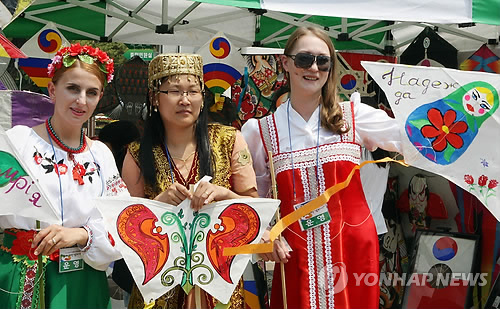‘Koreans not ready for multiculturalism’
Ratio of biracial babies rose to 4.7% in 2012
By Claire LeePublished : July 30, 2014 - 21:31
South Korea is quickly turning into a multicultural society with a growing number of biracial children, but the majority of Koreans are “not ready” for ethnic diversity, according to scholars and experts.
The number of biracial babies in the country increased dramatically, making up 4.7 percent of all newborns in 2012. In 2008, they accounted for 2.9 percent, and 4.3 percent in 2010. A total of 97,701 biracial children were born from 2008 to 2012, according to Statistics Korea.
However, Koreans tend to have racial and ethnic prejudice against immigrants based on their countries of origin, according to research by the Asan Institute for Policy Studies.
The number of biracial babies in the country increased dramatically, making up 4.7 percent of all newborns in 2012. In 2008, they accounted for 2.9 percent, and 4.3 percent in 2010. A total of 97,701 biracial children were born from 2008 to 2012, according to Statistics Korea.
However, Koreans tend to have racial and ethnic prejudice against immigrants based on their countries of origin, according to research by the Asan Institute for Policy Studies.

According to the report released in April, 65.9 percent of Koreans had a positive perception on immigrants from the U.S. while only 45.7 thought positively of immigrants from Nigeria. Almost 60 percent of Koreans viewed immigrants from Japan and China negatively, according to the report.
“One of the most concerning research findings was that most Koreans were only favorable to immigrants from the U.S., an advanced country as well as Korea’s biggest ally,” the report said.
“The number of Koreans who think positively of American immigrants was 25.6 percent higher than those who have a positive impression of immigrants from other countries.”
The number of Koreans who are not favorable toward foreign laborers has also been on the rise since 2010, according to the report. Koreans who think migrant workers don’t make enough efforts to adapt to life in Korea increased to 27.2 percent of the entire population in 2013 from 24.6 in 2010.
The report also pointed out that most of Korea’s “multicultural” policies and programs have been culturally assimilating. Most of the “multicultural” programs in the country ― 54.4 percent ― were educational programs for foreign wives on Korean manners and customs, while classes on Korean culture made up 16.1 percent of the programs.
“Multiculturalism and multicultural policies originally refer to the act of respecting different cultures and ethnicities, and helping newcomers adjust to life in a new place without forcing them to assimilate to the new culture,” the report said.
“Examples include allowing individuals to hold multiple nationalities and providing language courses in schools so ethnic minorities (and their children) can learn their mother tongue. But Korea’s multicultural policies have been in fact focusing on assimilation rather than supporting diversity.”
By Claire Lee (dyc@heraldcorp.com)


















![[Today’s K-pop] Treasure to publish magazine for debut anniversary](http://res.heraldm.com/phpwas/restmb_idxmake.php?idx=642&simg=/content/image/2024/07/26/20240726050551_0.jpg&u=)